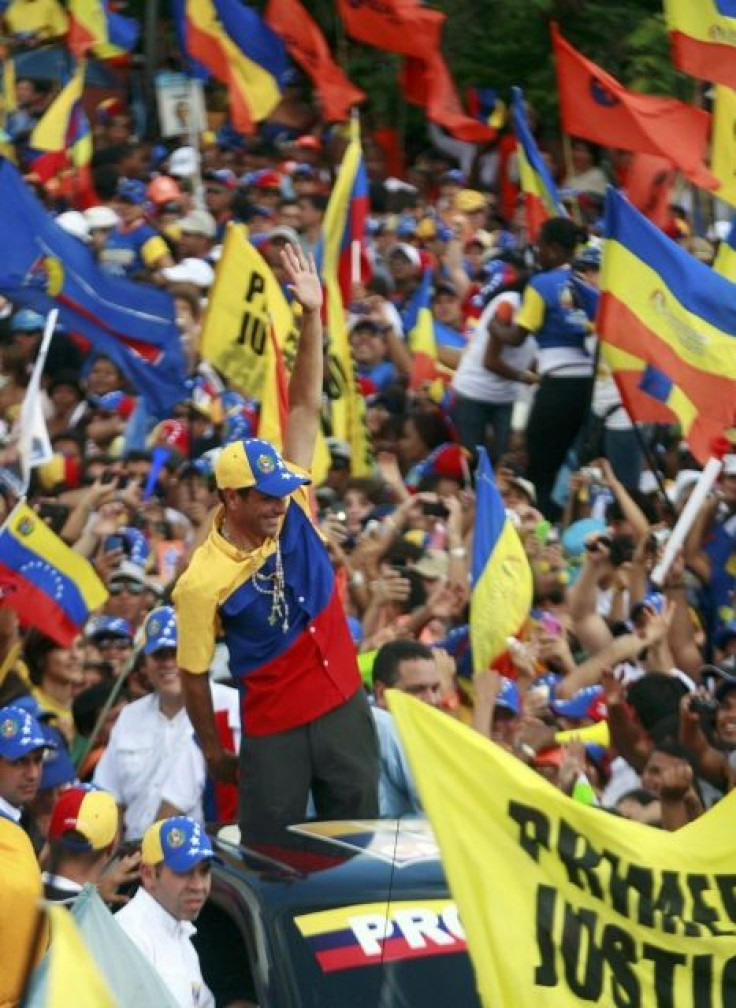Massive Rally For Henrique Capriles At Venezuelan Capital A Week Ahead Of Presidential Election

A massive crowd thronged the streets of Venezuela’s capital Caracas in support of opposition candidate Henrique Capriles Sunday, a week ahead of the country’s presidential election.
Capriles, who thanked his supporters, for “the biggest rally Caracas has ever seen,” criticized President Hugo Chavez for what he called a long list of unfulfilled promises.
“You see it; you feel it: President Capriles!" the crowd shouted, reported the AFP.
"I ask you, the Venezuelan people, to judge: who is part of the process of change. And who was sickened by power, clung to it and deceived the Venezuelan people?" Capriles was quoted as saying by AFP.
The authorities didn’t provide a crowd estimate, but wire agencies reported the presence of hundreds of thousands of opposition supporters. The crowd overflowed from Bolivar Avenue, which has the capacity to hold about 260,000 people, the Associated Press reported.
A rally led by Chavez Sunday saw tens of thousands of supporters in the western Zulia state.
Capriles demanded justice for three opposition activists killed during a rally in Chavez’s home state Barinas Saturday. Capriles' First Justice Party said gunmen shot at the activists during an opposition rally.
BBC reported eyewitnesses as saying that the gunmen fired from a van belonging to the state oil company, but it remained unconfirmed.
Venezuela’s Justice Minister Tareck El Aissami said on Twitter that a suspect was arrested in connection with the killings, without identifying him.
"On Oct. 7 we're going to defeat violence in Venezuela," Capriles was quoted saying by the AP. "Our country is tired of the violence, of the division, of the confrontation. ... The time of hatred is going to be buried in Venezuela."
Chavez also condemned the violence and asked his supporters not to “fall for provocations” during election time.
"I ask all Venezuelans, it's not with violence that we're going to face each other. It's vote against vote," Chavez said.
Speaking to AFP during a campaign rally in the east of Caracas Saturday, Chavez said he felt he had beaten cancer and that he would be strong enough to complete another six-year tenure if he won the re-election Oct.7.
The 57-year-old socialist leader, who has been in power for almost 14 years, had undergone three surgeries in less than a year and two sessions of radiation treatments in Cuba.
Venezuela, which topped Bloomberg's 2011 list of countries ranked by their misery rate, is grappling with issues like national housing crisis, power shortages, alarming surge in crime rate, inflation, weakening economy and rebranding of the leftist authoritarianism to accommodate the concerns regarding the state of democracy.
Capriles, the 39-year-old center-left state governor, won a primary election in February drawing 62 percent of the primary vote.
Chavez held a 10-point lead over Capriles in a survey released this week by the Venezuelan polling firm Datanalisis. However, Chavez could win the favor of only 49 percent of the respondents, a figure considerably lower than the 63 percent who voted for him in the 2006 presidential elections. About 11 percent of the respondents did not reveal their preference.
Notwithstanding the tumultuous relationship between Venezuela and the U.S., Chavez in an interview with the Venezuelan television network Televen, said if he were from the U.S. he would vote for President Barack Obama in the upcoming U.S. elections, AFP reported.
He added that if Obama were from a working-class Caracas neighborhood, he would "vote for Chavez.”
"Obama recently said something very rational and just: Venezuela is not a threat to the interests of the United States," Chavez said, calling the U.S. president a "nice guy."
He described Republican presidential candidate Mitt Romney’s “extreme right-wing” proposals as “truly irrational.”
He also suggested that if he and Obama won their respective re-elections, both nations, which don’t have their ambassadors in each others’ capitals, “could begin a new period of normal relations.”
© Copyright IBTimes 2024. All rights reserved.












